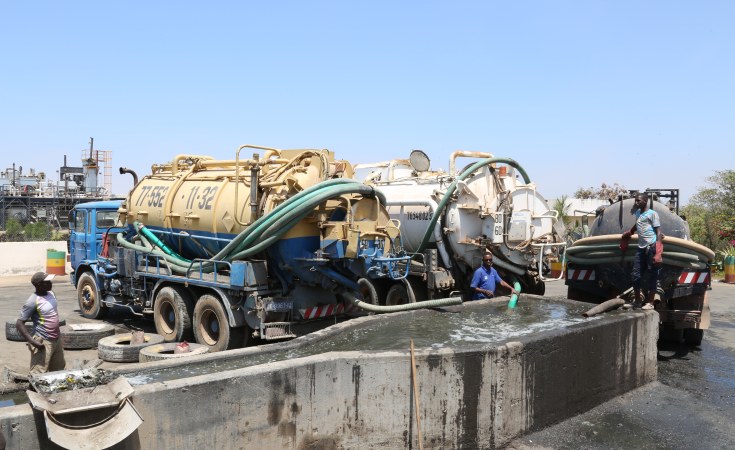Poor sanitation throughout the world is one of the most critical problems we face, yet it is the issue that gets the least amount of attention. Globally, 2.7 billion people must defecate in the open or don’t have access to adequate sanitation facilities. Without a reliable system to deal with fecal sludge, much of the waste is dumped haphazardly into communities. As a result, 700,000 children die each year from diseases related to contaminated water.
Beyond the serious health and environmental ramifications, poor sanitation cost the global economy US$222.9 billion in 2015, a 22 percent increase from five years earlier, making it a serious economic concern and a threat to people’s financial well-being.
Meanwhile, the water, sanitation and hygiene (WASH) sector is consistently placed at the bottom of the world’s priority list. Nations often see sanitation as a “business as usual” concern, one that doesn’t require an innovative strategic plan to transform how it is handled.
That will hopefully change with the adoption of the 2030 Agenda for Sustainable Development, in which countries throughout the world set a dedicated Sustainable Development Goal (SDG 6) to “ensure availability and sustainable management of water and sanitation for all.” SDG 6 takes the original Millennium Development Goal that focused on drinking water and sanitation a step further, aiming to address the entire water cycle, including the management of water, wastewater and ecosystem resources. SDG 6 was designed to link to and support the other SDGs and contribute to their ultimate success.
Achieving SDG 6 by 2030 will require a significant increase in funding from donors and governments, but it will also need opportunities for the exchange of ideas. That’s why the 4th International Fecal Sludge Management Conference is so important. This February, more than 1,000 sector experts, governmental officials and professionals convened in Chennai, India to discuss solutions, demonstrate innovative products and technologies, disseminate information and evidence, and build constructive partnerships and alliances. It’s here where the most promising solutions were showcased, and leaders from around the world could gather new ideas and knowledge that will help them develop smart fecal sludge management programs for their own nations, cities and communities.
One of the most impressive advances in fecal sludge management is taking place in Senegal. Like many major African metropolises, Senegal’s capital city of Dakar faces enormous sanitation challenges, particularly in the low-income suburban areas of Pikine and Guédiawaye. Of the almost 1.5 million people living in these areas, about 96 percent use on-site sanitation, which usually involves pit latrines located at individual households. Because the groundwater is shallow, this requires frequent pit emptying—usually twice a year.
However, residents are often unable to access emptying trucks when they need them, and because of weak competition, the cost of emptying is beyond the reach of the majority of the population, who typically live on less than $2 per day. Therefore, about 44 percent of households resort to manual emptying, which negatively impacts public health and the environment.
Realizing the need to address this situation and improve the entire fecal sludge management value chain in the region, the National Sanitation Office of Senegal (ONAS) partnered with the Bill & Melinda Gates Foundation to create the Program for the Structuring of the Fecal Sludge Market (PSFSM). This program has two primary aims: provide high-quality, inexpensive mechanical emptying services to consumers while also increasing the incomes of professional emptiers.
A key aspect of PSFSM is the call center, which facilitates a direct link between customers and emptiers. When the customer calls the center and requests emptying at a particular place, date and time, emptiers submit quotes through SMS. Once the bidding process is over, the lowest bidder and the customer are notified and the service is confirmed. This cutting-edge program allows for easy access to pit emptying and low prices for customers, increased opportunity for emptiers to expand their business, and quality control and monitoring conducted by the call center.
PSFSM includes a guarantee fund to promote the development of the fecal sludge emptying industry. Companies are provided with greater access to credit so they can improve their trucks and equipment and obtain the proper licenses and certifications. Similarly, PSFSM also works to help customers both save and pay for emptying services by making mobile money services more readily available.
Another crucial aspect of Senegal’s fecal sludge management system is handing over responsibility of fecal sludge treatment plants (FSTPs) to the private sector. Previously, when the plants were managed by the government, they were in a state of advanced deterioration, they were not profitable or efficient, and they produced a minimal amount of byproducts from the sludge. With this unique public-private partnership now in place, the result has been the renovation of facilities, improvement of maintenance and operations, increased administrative organization, more marketing of dried sludge byproducts, and greater profitability.
Finally, the PSFSM has implemented a communication plan to ensure that the people and communities benefitting from these improvements and innovations take active ownership of the program and participate in significant behavioral change to ensure its success. With this communication plan, the government acknowledges that the only way improved sanitation practices will be adopted by the target populations is if they fully understand the importance of the new system, how the improved technology works, and how it will benefit their families and communities.
Senegal’s fecal sludge management program is truly groundbreaking in its multi-pronged approach and its attention to every aspect of the value chain. In just three and half years of operation, the PSFSM has seen significant success in the areas of efficiency, profitability and stakeholder satisfaction. Now other nations throughout the world can look to Senegal’s success—as well as the successes of South Africa and India—as examples of how government, private companies and citizens can work together to solve one of our most complex challenges.


